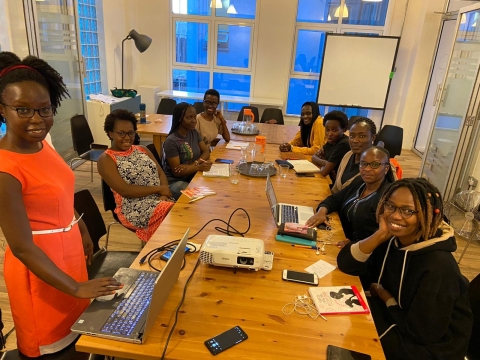A growing network of African women journalists and data experts is leading data-driven projects that are elevating female voices and shedding light on under-reported stories. The pan-African network, known as WanaData Africa, is changing the continent’s digital media landscape by reshaping the careers of its members, redefining them as newsroom innovators.
WanaData, which means “Daughters of Data” in Swahili, has grown in just three years to include nearly 100 women journalists and data experts across six countries. Members of the network — launched in 2017 in Nigeria with guidance from an ICFJ Knight Fellow — have collectively published more than 100 stories, including cross-border projects.
The network recently launched Trafficking Africa, for example, a transnational reporting project that will explore the national and international dimensions of human trafficking. Other cross-border projects include BornPerfect, which highlights stories of those affected by female genital mutilation; and GenderGap, a project that focuses gender inequality in income, property rights and education.
WanaData is now led by Catherine Gicheru, a veteran Kenyan editor and current ICFJ Knight Fellow. Gicheru, who works with digital pioneer Code for Africa during her fellowship, oversees nine chapters in six countries. Since the first chapter was launched in Nigeria by Code for Africa and ICFJ, new chapters have been established in South Africa, Tanzania, Uganda and Senegal.
“WanaData has shaped up to be a powerful vehicle for collaboration and learning for women journalists who sometimes have little access to such opportunities within the newsroom,” Gicheru said.
Fortified with valuable data skills, the women are producing coverage that is garnering widespread attention and propelling their careers forward.

Vanessa Offiong, a WanaData member in Nigeria was promoted to assistant editor at her newspaper, Daily Trust. “The stories I worked on funded by the WanaData Nigeria chapter gave me a boost in this regard as they brought something completely new to our newsroom,” she said. “I have learned to incorporate maps and other visual elements in my reporting.”
Wakini Njogu, a WanaData member in Kenya, also credits the training and mentorship received through the network with helping her career. "Before joining WanaData, I had never worked with data,” she said. “In just a year's time, I have gained data scraping and visualization skills, which have opened multiple doors for me professionally.”
The network offers training, reporting grants and mentorship. WanaData meet-ups are held monthly by each chapter. Members receive editorial support as well as access to a wide range of experts and tools, such as 360° cameras, drones and digital storytelling platforms. In addition, Code for Africa experts also help members access data resources and gain technical skills to produce their stories.
WanaData hopes to amplify women’s voices in the media by featuring more female experts, thought leaders and professionals who focus on under-reported stories that affect women, according to Gicheru.
“Ultimately, the idea is to create a collective of women data journalists who will produce robust content that will change Africa’s story,” she said.
All photographs provided by Code for Africa.